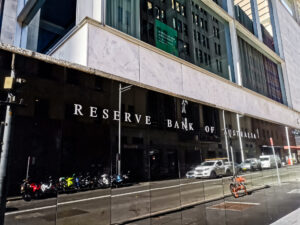With the Budget predicting a bad year ahead the RBA should not raise rates next week
Whenever Australia’s GDP per capita has gone backwards through a year Australia has been in recession or nearly so. And right now the Budget expects that to happen in 2023-24.
The latest national accounts figures released next week are expected to show a definite slowing of the economy brought on by the fastest increase in interest rates in over 30 years.
But the recent 2023-24 Budget reveals that this is just the start of the tough times.
While a recession is typically (and perhaps simplistically) referred to as two consecutive quarters of negative GDP growth another sign of a recession is when GDP per capita falls. GDP per capita takes into account changes in population. It is why sometimes, as occurred 4 times during 2016, 2017 and 2018, the economy can grow merely because we have more people in Australia consuming and producing.
And while it is not a sign of strength, it is not out of the ordinary for GDP per capita to fall in a quarter. But it is much less common for it to fall through an entire year.
In the past when GDP per capita has been lower than it was a year earlier, Australia has either been in a recession (such as in 1990 and during the pandemic) or in a near recession (the GFC). So it is never a good thing when GDP per capita is forecast to fall, and yet that is precisely what the May Budget has predicted for the financial year 2023-24 set to start next month.
This weak forecast for the economy highlights that the Reserve Bank should not raise rates again next week. The economy is already set to slow precariously close to a recession.
Given research by The Australia Institute that has shown inflation has mostly been driven by profits, and testimony by the Secretary of the Treasury, Steven Kennedy yesterday before the Senate Estimates economic committee that we are not experiencing a wage-price spiral, there is no reason to hit the economy again with another rate rise.
For now, the economy is likely to suffer a “GDP per capita” recession, but should the Reserve Bank continue to raise rates, there will likely be no need to attach a such modifier. The risks of a recession, however you measure it, will rise precipitously.
Between the Lines Newsletter
The biggest stories and the best analysis from the team at the Australia Institute, delivered to your inbox every fortnight.
You might also like
Fearful and frozen: Why the Reserve Bank continues to err on rates
The RBA’s failures have real consequences. It should go back and closely reread the recommendations of the RBA review, particularly the ones that encourage it to open up to new and diverse viewpoints.
When targeting inflation, the RBA misses more often than it hits
With the fight against high inflation now over, will the Reserve Bank fail to learn the lessons of the past and allow inflation to fall below 2%?
Delayed RBA cut is welcome, but borrowers are still lagging
The RBA has cut interest rates – five weeks too late.


